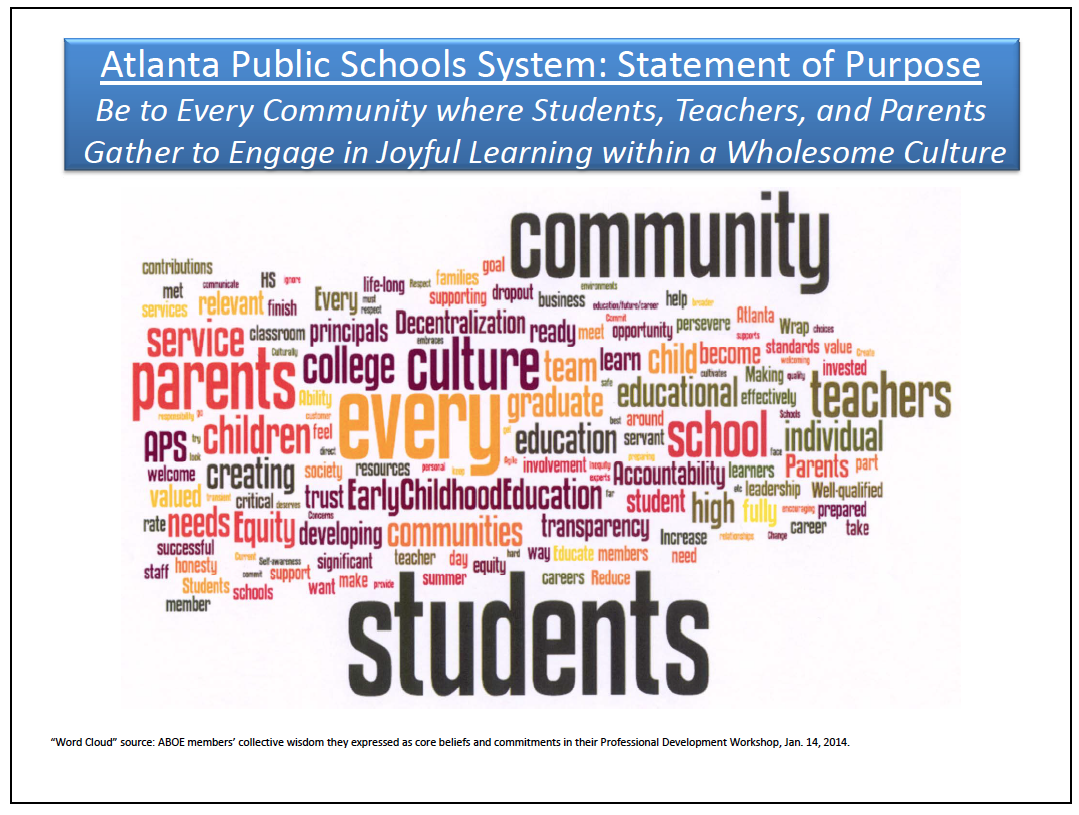Is the Atlanta School Board (APS) going to think differently? Its composition is different than it was a year ago. Six of the nine member board were elected to the Board in November.
On January 14th, the Atlanta School Board met to discuss the nature of the school system, and to draft an APS Statement of Purpose.
In addition to the members of the board, and Dr. Cathy Mincberg of the Center for Reform of School Systems (CRSS), Mr. Ed Johnson was in attendance, and participated in some aspects of the meeting. (Note: Mr. Johnson, an advocate for quality public education, ran for a seat on the board in the last election, but was not elected. However, he has for years been actively collaborating with Atlanta school officials, including the board).
Keep in mind that Atlanta is in the middle of the process to hire a new school superintendent. According to Ed Johnson, the new board is interested in formulating a statement of core beliefs and strategies to aid in the selection process.
In a letter shared by Mr. Johnson after the January 14th meeting, it appears as if some of the board members are interested in thinking differently. Here is part of Mr. Johnson’s letter:
It will be my pleasure to offer, by your invitation, a recap of my observations of your work today with Dr. Cathy Mincberg of the Center for the Reform of School Systems (CRSS) to help you articulate core beliefs and strategies for interviewing and selecting a new superintendent.
For now, I say thanks to ABOE member Matt Westmoreland for inviting me to comment on an aspect of your proceedings. I also say thanks to ABOE Chair Courtney English for going with my suggestion to synthesize your collective wisdom into a Wordle (“word cloud”) to be examined for noteworthy words that might come together in an APS Statement of Purpose. I hope to share that Wordle with others; it is quite interesting, both for words that stand out and words that do not stand out. Dr. Mincberg had solicited and written down, in some detail, your collective wisdom, save that of ABOE member Jason Esteves who was absent.
APS Board Wordle: Be to Every Community…
The wordle below is a kind of summary of the “collective wisdom” of the board during a the meeting. Ed Johnson has used the “collective wisdom” depicted in the wordle to write a statement of purpose for the Atlanta Public Schools.
In a letter to the APS Board, Mr. Johnson had this to say:
Good afternoon, ABOE Members and Dr. Grant:
Again, your Wordle (“word cloud”) is quite interesting. Because it has been so begging of my attention, I have drafted from it a sample APS Statement of Purpose. Kindly see that attachment.
Again, it is just a sample, an idea for you to consider. Still, I am by bcc, here, also sharing the attachment with the greater community with the invitation to reply to you with their ideas about it.
Too, how about this? Present the APS Statement of Purpose along with your Wordle to each superintendent candidate finalist and ask: “What story do you see in this?”
Reading Assignment
Another important part of this meeting is that Ed Johnson is a “systems thinker,” and has written and spoken about why schools need to embrace the world view of systems thinking to improve schools. Clearly, his synthesis of the APS Board wordle into this statement sets the tone for what education in Atlanta could become.
Be to Every community where Students, Teachers, and Parents Gather to Engage in Joyful Learning within a Wholesome Culture—Ed Johnson
To help the APS Board members understand the nature of systems thinking as it relates to school, he said this:
On the matter of the superintendent search, kindly allow me the pleasure to give each of you a copy of the book “The System Thinking School: Redesigning Schools From the Inside-Out (Leading Systemic Improvement),” by Peter A. Barnard.
Expect 13 copies to arrive from amazon.com addressed to Attn: Dr. Howard Grant. The total shipment may arrive in parts at different times. Nonetheless, the total shipment will also include a copy for Dr. Alexis Kirijan and Mr. Steve Smith as well as for the Superintendent Search Committee Chair, Ms. Anne Crammer. As always, there are no strings attached, and everyone may do with her or his copy as she or he pleases.
But in this case I do offer this advice: Read in the book BEFORE you hire the new APS superintendent.
Thinking Different
It appears as if the APS Board is off to an interesting start. The book that Mr. Johnson has ordered for each member is a powerful document on school reform. But to embrace the ideas in Peter Barnard’s new book, The Systems Thinking School, the leaders in Atlanta will have to think different. Here is opening paragraph of the Foreword to Barnard’s book:
Peter Barnard might as well have called this book Thinking because that is what he invites readers to do. It is time, he argues passionately, to set aside all the tinkering that sits at the heart of modern school improvement and reform and recognize that the problem is not performance. The problem is the linear system we are stuck with. Barnard, Peter A. (2013-09-19). The Systems Thinking School: Redesigning Schools from the Inside-Out (Leading Systemic School Improvement) (Kindle Locations 34-37). R&L Education. Kindle Edition.



You must be logged in to post a comment.